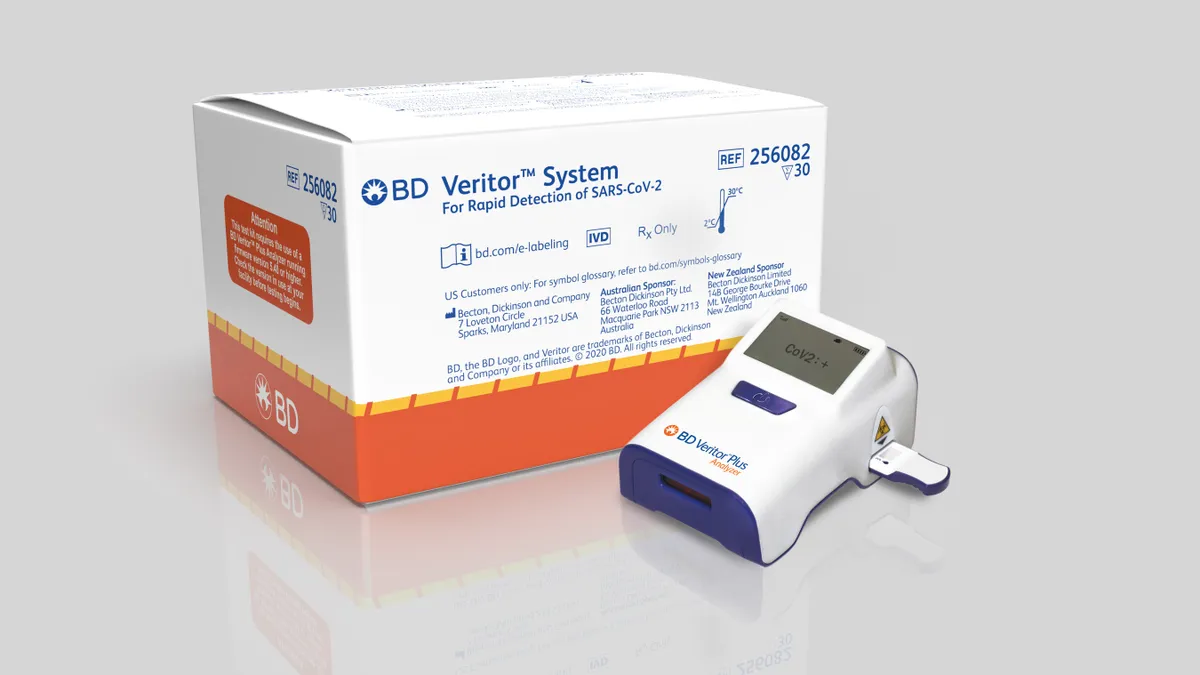Dive Brief:
- BD on Wednesday announced results of a head-to-head study it funded pitting its Veritor antigen test for detection of SARS-CoV-2 against Quidel's Sofia assay. It found equivalent performance between the two rapid point-of-care diagnostics despite a difference in sensitivity claims published in emergency use authorization documentation that gave the advantage to BD's rival.
- Charles Cooper, VP for medical and scientific affairs at BD and a co-author on the preprint paper, contends the difference in the published sensitivity claims for the Quidel test (96.7%) versus the Veritor system (84%) was not supported by BD's blinded head-to-head study that included 361 patient samples representing a cross-sectional population. Cooper, a co-author, opined that differences in study designs and patient populations between the studies "probably" account for the results and may influence performance estimates and sensitivity claims for such SARS-CoV-2 antigen tests.
- Quidel CEO Doug Bryant acknowledged in a written statement that BD's study "appears to demonstrate that in the samples selected from symptomatic patients within five days of the onset of symptoms and with low PCR Ct values, the BD assay showed acceptable agreement with our Lyra PCR and Sofia SARS Antigen assays." However, Bryant added that "how rapid antigen assays perform on asymptomatic patients might be a more interesting and relevant question" given estimates that between 30% and 60% of COVID-19 cases are transmitted from people carrying the virus without any symptoms.
Dive Insight:
COVID-19 antigen tests have until recently been considered less sensitive than polymerase chain reaction (PCR) tests, the current gold standard due to high sensitivity and specificity. However, Quidel in July shared data showing its antigen test had 96.7% sensitivity within five days of the onset of patient symptoms.
The results for the company's Sofia SARS Antigen FIA, which in May was the first such diagnostic to receive FDA emergency use authorization, are in line with the sensitivity rates of PCR tests. However, BD's new head-to-head study announced Wednesday reported that BD's Veritor system had "more agreement with PCR analysis" than the Quidel's Sofia assay in the case of seven discrepancies.
"PCR analysis agreed with the BD Veritor Plus system on five results and agreed with the Sofia 2 SARS AFI on two results. Overall, the study suggests a high degree of agreement in testing accuracy between the two systems," BD's announcement said.
Cooper said in the company's study "98.1% of the time" the positive and negative test results generated by both the BD and Quidel assays were the same. "With regard to sensitivity and specificity, additional PCR testing needs to occur," he added.
Notwithstanding, the advantage of antigen tests over PCR tests is that they can rapidly generate results. Both BD's and Quidel's antigen assays yield results in about 15 minutes. The state of Maryland is buying into the benefit of the BD tests, announcing Thursday it purchased 250,000 of them.
"These tests may be less sensitive than PCR tests but results are received the same day, allowing rapid isolation," according to a report on U.S. COVID-19 testing strategies issued Wednesday by Duke University's Margolis Center for Health Policy and the Rockefeller Foundation.
The Duke-Rockefeller report concludes that conducting tests of varying levels of sensitivity, including rapid PCR and antigen testing, could reduce America's overall rate of virus transmission when they are performed frequently and with quick turnaround times.
"Testing capacity must increase in order to limit outbreaks while reopening schools and controlling infection spread in nursing homes," the authors wrote, projecting the U.S. will require nearly 200 million tests each month for students and staff at the nation's primary and secondary schools, as well as residents and staff at nursing homes.
Currently, the country's COVID-19 testing capacity is about 21 million tests per month, a far cry from what's needed to safely reopen schools and help nursing homes. However, major test makers have committed to producing tens of millions of antigen tests in coming months to bolster testing capacity.
The Department of Health and Human Services in late August awarded a $760 million contract to Abbott Laboratories for 150 million rapid, point-of-care antigen tests to be deployed in 2020 to schools and vulnerable U.S. populations.
Roche earlier this month said it will start selling an instrument-free COVID-19 antigen test in Europe later in September and is seeking emergency use authorization from FDA. The company expects to be making 40 million of the SARS-CoV-2 Rapid Tests per month when it launches this month and more than double that figure by the end of the year.
Roche's antigen test is similar to an Abbott diagnostic that won an EUA in late August. Both tests provide results in 15 minutes without the use of instruments needed by competing products sold by BD and Quidel, which both received EUAs, as did LumiraDX's SARS-CoV-2 Ag Test, which provides results within 12 minutes.













